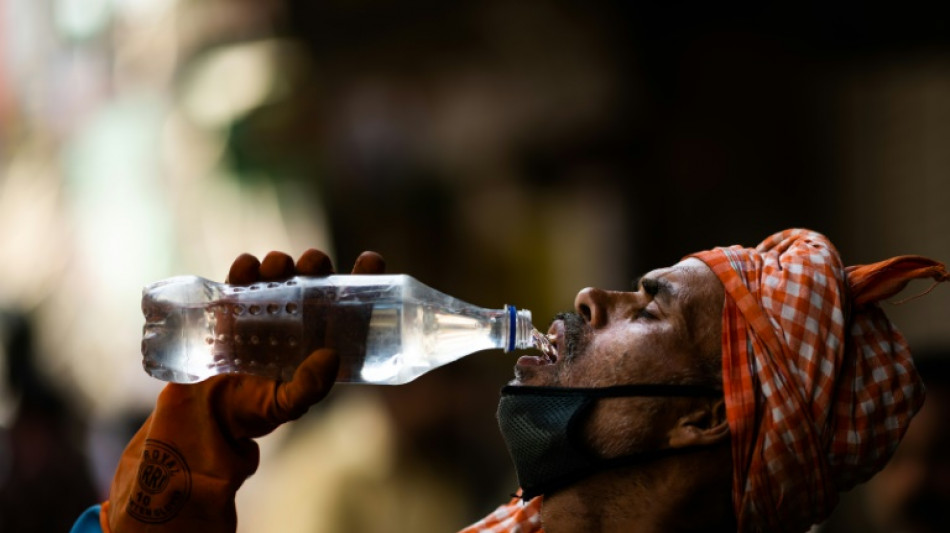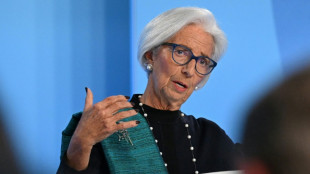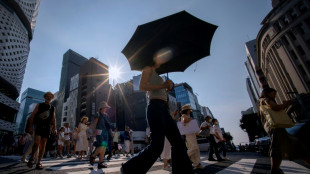
-
 Brazil, Mexico seek to defuse US-Venezuela crisis
Brazil, Mexico seek to defuse US-Venezuela crisis
-
Assange files complaint against Nobel Foundation over Machado win

-
 Private donors pledge $1 bn for CERN particle accelerator
Private donors pledge $1 bn for CERN particle accelerator
-
Russian court orders Austrian bank Raiffeisen to pay compensation

-
 US, Qatar, Turkey, Egypt to hold Gaza talks in Miami
US, Qatar, Turkey, Egypt to hold Gaza talks in Miami
-
Lula open to mediate between US, Venezuela to 'avoid armed conflict'

-
 Brussels farmer protest turns ugly as EU-Mercosur deal teeters
Brussels farmer protest turns ugly as EU-Mercosur deal teeters
-
US imposes sanctions on two more ICC judges for Israel probe

-
 US accuses S. Africa of harassing US officials working with Afrikaners
US accuses S. Africa of harassing US officials working with Afrikaners
-
ECB holds rates as Lagarde stresses heightened uncertainty

-
 Trump Media announces merger with fusion power company
Trump Media announces merger with fusion power company
-
Stocks rise as US inflation cools, tech stocks bounce

-
 Zelensky presses EU to tap Russian assets at crunch summit
Zelensky presses EU to tap Russian assets at crunch summit
-
Pope replaces New York's Cardinal Dolan with pro-migrant bishop

-
 Odermatt takes foggy downhill for 50th World Cup win
Odermatt takes foggy downhill for 50th World Cup win
-
France exonerates women convicted over abortions before legalisation

-
 UK teachers to tackle misogyny in classroom
UK teachers to tackle misogyny in classroom
-
Historic Afghan cinema torn down for a mall

-
 US consumer inflation cools unexpectedly in November
US consumer inflation cools unexpectedly in November
-
Danish 'ghetto' residents upbeat after EU court ruling

-
 ECB holds rates but debate swirls over future
ECB holds rates but debate swirls over future
-
Pope replaces New York's Cardinal Timothy Dolan with little-known bishop

-
 Bank of England cuts interest rate after UK inflation slides
Bank of England cuts interest rate after UK inflation slides
-
Have Iran's authorities given up on the mandatory hijab?

-
 Spain to buy 100 military helicopters from Airbus
Spain to buy 100 military helicopters from Airbus
-
US strike on alleged drug boat in Pacific kills four

-
 Thailand strikes building in Cambodia's border casino hub
Thailand strikes building in Cambodia's border casino hub
-
Protests in Bangladesh as India cites security concerns

-
 European stocks rise before central bank decisions on rates
European stocks rise before central bank decisions on rates
-
Tractors clog Brussels in anger at EU-Mercosur trade deal

-
 Not enough evidence against Swedish PM murder suspect: prosecutor
Not enough evidence against Swedish PM murder suspect: prosecutor
-
Nepal's ousted PM Oli re-elected as party leader

-
 British energy giant BP extends shakeup with new CEO pick
British energy giant BP extends shakeup with new CEO pick
-
Pulitzer-winning combat reporter Peter Arnett dies at 91

-
 EU kicks off crunch summit on Russian asset plan for Ukraine
EU kicks off crunch summit on Russian asset plan for Ukraine
-
Lyon humbled to surpass childhood hero McGrath's wicket tally

-
 Sri Lanka plans $1.6 bn in cyclone recovery spending in 2026
Sri Lanka plans $1.6 bn in cyclone recovery spending in 2026
-
England vow to keep 'fighting and scrapping' as Ashes slip away

-
 'Never enough': Conway leans on McKenzie wisdom in epic 300 stand
'Never enough': Conway leans on McKenzie wisdom in epic 300 stand
-
Most Asian markets track Wall St lower as AI fears mount

-
 Cambodia says Thailand bombs casino hub on border
Cambodia says Thailand bombs casino hub on border
-
Thai queen wins SEA Games gold in sailing

-
 England Ashes dreams on life-support as Australia rip through batting
England Ashes dreams on life-support as Australia rip through batting
-
Masterful Conway, Latham in 323 opening stand as West Indies wilt

-
 Danish 'ghetto' tenants hope for EU discrimination win
Danish 'ghetto' tenants hope for EU discrimination win
-
Cricket Australia boss slams technology as Snicko confusion continues

-
 Conway and Latham's 323-run opening stand batters hapless West Indies
Conway and Latham's 323-run opening stand batters hapless West Indies
-
Alleged Bondi shooters holed up in hotel for most of Philippines visit

-
 Japan govt sued over 'unconstitutional' climate inaction
Japan govt sued over 'unconstitutional' climate inaction
-
US approves $11 billion in arms sales to Taiwan: Taipei


'Dangerous' heatwaves likely to grip the tropics daily by 2100: study
Many millions of people in the tropics could be exposed to dangerous heat for half the year by 2100 even if humanity manages to meet climate goals, researchers warned Thursday.
In the most likely scenario, the world would miss those targets -- potentially subjecting people across the tropics to harmful temperatures most days of each typical year by the end of the century, the study found.
If emissions go unchecked, large numbers of people in these regions could face potentially "nightmarish" periods of extreme heat.
"There's a possibility that if we don't get our act together, billions of people are going to be really, really overexposed to these extremely dangerous temperatures in a way that we just fundamentally haven't seen," said lead author Lucas Vargas Zeppetello of Harvard University.
Severe heatwaves -- made hotter and more frequent by climate change -- are already being felt across the world, threatening human health, wildlife and crop yields.
Most climate projections predict temperature increases under different policy scenarios, but do not say which of those pathways is more likely.
In this study, published in the journal Communications Earth and Environment, researchers estimated potential exposure to dangerous heat and humidity.
They used statistical projections to predict levels of carbon dioxide emissions from human activity and the resultant levels of global warming.
They found that many people in tropical regions could face dangerous heat levels for half the year by the end of the century, even if the world limits temperature rises to the Paris climate deal goal of less than two degrees Celsius (35.6 degrees Fahrenheit) above preindustrial levels.
Outside the tropics, they said deadly heatwaves will likely become annual occurrences.
The researchers used a heat index that puts "dangerous" levels at 39.4C, while temperatures above 51C are considered "extremely dangerous" and totally unsafe for humans.
The extreme measure was originally developed for people working in scorching indoor environments, like a ship's boiler room, and have rarely been observed outdoors, Zeppetello said.
But by the end of the century, the researcher said it was "virtually guaranteed" that people in some parts of the tropics would experience this level of heat every year unless emissions are severely curtailed, with swathes of sub-Saharan Africa and India particularly at risk.
"That's pretty scary," he told AFP, adding that even walking outside would be dangerous under those conditions.
- 'Nightmarish' conditions -
Earth has warmed nearly 1.2C so far and current predictions based on countries' carbon-cutting pledges would see the world far exceed the Paris Agreement's 2C target for 2100, let alone its more ambitious 1.5C aspiration.
In their research Zeppetello and colleagues analysed predictions from global climate models, human population projections, and looked at the relationship between economic growth and carbon emissions.
They estimated that there is only a 0.1 percent chance of limiting global average warming to 1.5C by 2100, projecting that the world is likely to reach 1.8C by 2050.
In 2100, the researchers found, the most likely global average temperature rise would be 3C, which Zeppetello said would spell "nightmarish" conditions for many people.
In a worst case scenario, in which emissions continue unchecked, he said extreme temperatures could last up to two months every year in parts of the tropics.
But he said it depends on how swiftly humanity can cut emissions.
"We don't have to go to that world. There's nothing right now that says it is a certainty, but people need to be aware of just how dangerous that would be if it were to pass," he said.
The researchers said that under all scenarios there could be a large increase in heat-related illnesses, particularly among the elderly, vulnerable and those working outside.
"I think this is a very important point that is receiving far too little attention," said Kristin Aunan, a research professor at the Center for International Climate Research specialising in emissions and human health, who was not involved in the study.
"Reduced workability in outdoor environments could have large economic impacts in addition to the human suffering arising from having to work under extreme temperatures," she told AFP, adding crop production and livestock can also be affected by temperature extremes.
M.Odermatt--BTB
